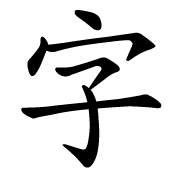Courtesy name
| Courtesy name (Zi) | |
|---|---|
 | |
| Chinese name | |
| Simplified Chinese | (表) 字 |
| Hanyu Pinyin | (biǎo) zì |
| Wade–Giles | (piao)-tzu |
| Vietnamese name | |
| Vietnamese | tên chữ (tự) |
| Korean name | |
| Hangul | 자 |
| Hanja | 字 |
| Revised Romanization | ja |
| McCune–Reischauer | cha |
| Japanese name | |
| Kanji | 字 |
| Hiragana | あざな |
| Revised Hepburn | azana |
A courtesy name (Chinese zi (pinyin: zì, Chinese: 字)) style name[1] or appellative, is a name bestowed upon a person at adulthood in addition to his or her given name.[2] This is a tradition in East Asian cultures, including China and China-influenced countries such as Japan, Korea, and Vietnam.[citation needed] However, the popularity has seen a decline to some extent since the May Fourth Movement in 1919.[citation needed]
Formerly, the zi would replace a male's given name when he turned twenty as a symbol of adulthood and respect.[citation needed]. It could be given either by the parents or by the first personal teacher on the first day of family school. One may also adopt a self-chosen courtesy name.
Females might substitute a zi for their given name upon marriage.
It is notable that a courtesy name is not to be confused with an art name (hào, Chinese: 号), another frequently mentioned term for an alternative name in Asian culture-based context. As its name reveals, an art name is usually associated with art and is more of a literary name or a pseudonym that is more spontaneous compared to a courtesy name.
Usage
The zì, sometimes called the biǎozì or "courtesy name", is a name traditionally given to Chinese males at the age of 20, marking their coming of age. It was sometimes given to females upon marriage. The practice is no longer common in modern Chinese society. According to the Book of Rites, after a man reaches adulthood, it is disrespectful for others of the same generation to address him by his given name, or míng. Thus, the given name was reserved for oneself and one's elders, while the zì would be used by adults of the same generation to refer to one another on formal occasions or in writing; hence the term "courtesy name".
The zì is mostly disyllabic (comprises two characters) and is usually based on the meaning of the míng or given name. Yan Zhitui of the Northern Qi Dynasty believed that while the purpose of the míng was to distinguish one person from another, the zì should express the bearer's moral integrity.
The relation which often exists between a person's zì and his míng can be seen in the case of Mao Zedong (毛泽东), whose zì was Rùnzhī (润之). These two characters share the same radical - 氵, which signifies water. Both characters can mean "to benefit" or "to nourish".
Another way to form a zì is to use the homophonic character zǐ (子) - a respectful title for a male - as the first character of the disyllabic zì. Thus, for example, Gongsun Qiao's zì was Zǐchǎn (子產), and Du Fu's: Zǐměi (子美).
It is also common to construct a zì by using as the first character one which expresses the bearer's birth order among male siblings in his family. Thus Confucius, whose actual name was Kǒng Qiū (孔丘), was given the zì Zhòngní (仲尼), where the first character zhòng indicates that he was the second son born into his family. The characters commonly used are bó (伯) for the first, zhòng (仲) for the second, shū (叔) for the third, and jì (季) typically for the youngest, if the family consists of more than three sons.
The use of zì began during the Shang Dynasty and slowly developed into a system, which became most widespread during the succeeding Zhou Dynasty . During this period, women were also given zì. The zì given to a woman was generally composed of a character indicating her birth order among females siblings and her surname. For example, Mèng Jiāng (孟姜) was the eldest daughter in the Jiāng family.
Prior to the 20th century, sinicized Koreans, Vietnamese, and Japanese were also referred to by their zì.
Examples
| Family name | Given name | Zì | |
|---|---|---|---|
| Laozi 老子 | Lǐ (李) | Ěr (耳) | Bó Yáng (伯陽) |
| Confucius 孔子 | Kong (孔) | Qiu (丘) | Zhòngní (仲尼) |
| Cao Cao 曹操 | Cao (曹) | Cao (操) | Mengde (孟德) |
| Liu Bei 劉備 | Liu (劉) | Bei (備) | Xuande (玄德) |
| Sima Yi 司馬懿 | Sima (司馬) | Yi (懿) | Zhòngdá (仲達) |
| Zhuge Liang 諸葛亮 | Zhuge (諸葛) | Liang (亮) | Kongming (孔明) |
| Li Bai 李白 | Li (李) | Bai (白) | Taibai (太白) |
| Yue Fei 岳飛 | Yue (岳) | Fei (飛) | Pengju (鵬舉) |
| Tang Yin 唐寅 | Tang (唐) | Yin (寅) | Bohu (伯虎) |
| Sun Yat-sen 孫逸仙 | Sun (孫) | Deming (德明) | Zai zhi (載之) |
| Mao Zedong 毛澤東 | Mao (毛) | Zedong (澤東) | Runzhi (潤之) |
Notes
- ^ Tianjun Liu, Xiao Mei Qiang (2013). Chinese Medical Qigong. p. 590. ISBN 1848190964.
Mencius (371—289 BCE), born in Zou county (Shandong province), first name Ke, style name Zi Yu, was a famous philosopher, educator, politician, and expert on the Qigong life nurturing of Confucius in the Zhanguo Period.
- ^ Origins of Chinese Names. 2007. p. 142. ISBN 9812294627.
In ancient times, besides having a surname and a given name, one would have a courtesy name "Zì" as well. The courtesy name was the proper form of address for an adult. On reaching 20 years of age, young men would "put on the hat" as ...
